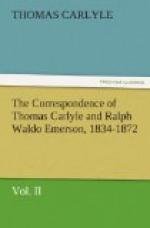I did not mean to chatter so much, but I wish you would come out hither and read our possibilities now being daily disclosed, and our actualities which are not nothing. I shall like to show you my near neighbors, topographically or practically. A near neighbor and friend, E. Rockwood Hoar, whom you saw in his youth, is now an inestimable citizen in this State, and lately, in President Grant’s Cabinet, Attorney-General of the United States. He lives in this town and carries it in his hand. Another is John M. Forbes, a strictly private citizen, of great executive ability, and noblest affections, a motive power and regulator essential to our City, refusing all office, but impossible to spare; and these are men whom to name the voice breaks and the eye is wet. A multitude of young men are growing up here of high promise, and I compare gladly the social poverty of my youth with the power on which these draw. The Lowell race, again, in our War yielded three or four martyrs so able and tender and true, that James Russell Lowell cannot allude to them in verse or prose but the public is melted anew. Well, all these know you well, have read and will read you, yes, and will prize and use your benefaction to the College; and I believe it would add hope, health, and strength to you to come and see them.
In my much writing I believe I have left the chief things unsaid. But come! I and my house wait for you.
Affectionately,
R.W.
Emerson
CLXXXVIa. Emerson to Carlyle
Concord, 10 April, 1871
My Dear Friend,—I fear there is no pardon from you, none from myself, for this immense new gap in our correspondence. Yet no hour came from month to month to write a letter, since whatever deliverance I got from one web in the last year served only to throw me into another web as pitiless. Yet what gossamer these tasks of mine must appear to your might! Believe that the American climate is unmanning, or that one American whom you know is severely taxed by Lilliput labors. The last hot summer enfeebled me till my young people coaxed me to go with Edward to the White Hills, and we climbed or were dragged up Agiocochook, in August, and its sleet and snowy




